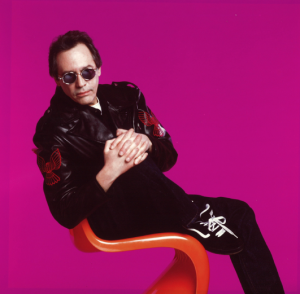
Did you listen to the radio every Friday Night?
So sang Saxon on ‘Denim & Leather’ and it’s without a doubt that the Friday Rock Show and the voice of Tommy Vance is at the centre of the very foundation Iron Fist Magazine is based upon. On the anniversary of his death in 2005, it is fitting that Vintage TV are planning on bringing back the Friday Rock Show with Nicky Horne. Guy Strachan spoke to FRS producer Tony Wilson about this slice of heavy metal history
“The Friday Rock Show was the only education I needed” Shane Embury, Napalm Death
“I knew Tommy from our first album. He helped our career more than people realise. I’ve got many memories of him. He came to see us several times both in the studio and live and was always supportive. The Friday Rock Show was the MTV of the UK – if you were on the show – you’d made it.” Biff Byford, Saxon
It’s been a tough time for the BBC of late, what with scandals, debates about its licence-funded future and costly moves up and down the country, such stories often overshadow just how much of an influence the organisation’s output has had on many people. Ask any hardened music fan how they spent their evenings during the ’70s and ’80s, and the name of at least one of the BBC’s radio shows will probably get mentioned with a teary eye and a fond memory.
As noted in the lyrics to Saxon’s ‘Denim And Leather’, for rock and heavy metal fans Friday nights would be spent listening to the Friday Rock Show that ran for around 15 years, beginning in the late-’70s and ran through to the mid-’90s. The producer of the show was Tony Wilson. Joining the BBC straight from school in 1963 as a trainee sound engineer, he soon began to specialise in music recording and found himself recording bands such as Led Zeppelin, King Crimson and Roxy Music. Gravitating towards the heavier end of the musical spectrum, he found little pleasure in recording endless streams of pop artists and was, on more than one occasion, so disheartened that he contemplated a change in employer. Eventually sticking it out, his patience was rewarded in 1972 when he became a producer.
“I started producing Alan ‘Fluff’ Freeman on his weekday afternoon show and because he was a real rock fan himself and because of my interests, we stared sneaking the odd bit of rock into his afternoon show,” says Tony. “We started making up rock jingles and ‘stabs’ that he would use throughout the show and also play the odd rock track; Argent, Yes, that sort of thing, and in the end, after this had been going on for six or nine months, Derek Chinnery, who was the station controller at the time, decided he’d had enough of it and he offered Fluff and I a show on Saturday afternoons as a rock show. So, Alan gave up his weekday show and we instead concentrated on this weekly, three-hour rock show, which we did for five years and that was incredibly successful in all sorts of ways.”
That show ran for around five years and proved to be incredibly successful, picking up several awards during its run. In 1978, however, changes were afoot. Derek Chinnery had decided that, in something that was to become a regular hallmark of Radio 1, the show’s presenter was past his prime and that a younger presenter was needed. This from someone who is alleged to have described Radio 1’s audience as “unemployed student louts with no money to spend”. Those changes would ultimately be the genesis of The Friday Rock Show.
“In 1978, Chinnery wanted to ease Alan out, [as he] thought he was getting too old, which of course was a complete joke. He left around August [for Capital Radio] and I indicated that I wanted to find somebody else and carry on doing a rock show. I’d been looking around to see who there was and Tommy [Vance] had been doing a rock show on Capital on a Saturday evening, and he was the one that I decided was probably the best bet. He came in and we did a pilot programme. I took it to Chinnery. His reaction was to roll his eyes to the ceiling and say, ‘If you must have one of these old has-beens back, on your own head be it’,” he laughs, “because Tommy had been at Radio 1 in the very early days.”
Born Richard Anthony Crispian Francis Prew Hope-Weston, Tommy Vance had commenced his DJ career in America, working for stations in Seattle and Los Angeles, before returning to England and working for each of the three main ‘pirate’ stations (Radio Caroline, London and Luxembourg), before joining the BBC in time for the launch of Radio 1 in 1967, presenting the ‘Top Gear’ programme with John Peel (which was to evolve into Peel’s show in its own right). In several ways, the Friday Rock Show bore similarities to John Peel’s own show, not least through its use of sessions. Arguably one of the BBC’s best creations, the sessions gave an audience the chance to hear a band more or less live in the studio without, by virtue of the brevity of recording time available, all the tricks of studio that many bands frequently indulged. Yet the original idea of sessions went back many years before FRS, and was brought about by necessity over anything else.
“For the first few years two or three years, we didn’t have any sessions on the FRS, in fact I was still, at that point, doing a lot of music production for other shows. I was one of the main Peel show session producers, so what I tended to do in Fluff’s afternoon show and continuing on FRS was to make use of some of what we’d recorded for Peel’s show where stylistically appropriate,” says Tony. “The thing is that sessions, really, which now of course are considered to be the most wonderful thing in the world, were borne out of adversity and the PPL [Phonographic Performance Limited], which had a very tight rein on what was called ‘needle time’. For years and years, there were almost cripplingly low limits on the amount of needle time [i.e. record plays] that could be played on any shows and so the need to record oodles and oodles of sessions with all and sundry was really forced onto the BBC to provide a music service because it couldn’t play more than, say, a quarter of the necessary music for a show [from records]. Of course, an awful lot of really good music came out of these sessions and continues to do so, but that wasn’t really the reason they were done,” he laughs.
Alongside the sessions, there were the jingles that bands were encouraged to record as part of their session (from memory, Saxon, Samson and Vow Wow all stepped up to the plate), as well as a healthy number of gigs recorded for broadcast. Annual forays to the Reading and Donington Monsters Of Rock festivals were generally a given, but there were a whole host of other shows were captured and aired.
“These things tend to decide themselves a bit, in that the bigger the band often more difficult it is to get agreement to record them, especially if they’re American with management that don’t really focus on anything until about three days before it’s going to happen! Everything had to be nailed down with contracts, fees paid and so forth, so there was a whole negotiation process involved in doing anything like that. So there was with the smaller set of bands, but largely they were happy to sign anything, grateful to get some money and happy to be broadcast on the radio!”
The name of the Friday Rock Show is inextricably entwined with the rise of the New Wave of British Heavy Metal. Broadcasting across the nation in full stereo, it became about the only place where the bands that people had read about could actually be heard the length and breadth of the country, outside of the band in question bumping about Britain in the back of a transit which, for the average independent band, was a no-go.
“Well, it was almost simultaneous,” says Tony on whether the show gained an increased audience thanks to the NWOBHM explosion. “The show started in October 1978 and really the earliest wisps of NWOBHM can’t have been that far distant from that date; certainly by a year or so later. I think the show almost grew with the growth of NWOBHM, although of course it did kind of ride on the wave of that in terms of audience interest and appreciation by the bands and audiences in that they could hear a lot of what was going on.
“Mostly, it was just, ‘This is great’,” says Tony when asked what drove the selection of material to be played. “It was very much moment to moment, ‘We have to play this’ sort of thing. There was always much too much material, most of which couldn’t be played because there wasn’t room, so it was a case of whittling it down to the best of what was around, while maintaining a mix of sounds and genres.”
The key phrase of a ‘mix of sounds and genres’ is one of the reasons why FRS was held up in such high regard and was also able to reach such a large amount of listeners. Okay, it wasn’t quite like John Peel assaulting Carcass fans with Four Brothers (and vice versa), but whatever your preference within rock, from thrash to heavy, from glam to AOR, there would be several records to float your boat in each and every show.
“Yes; that’s quite a BBC philosophy,” says Tony. “Educate and entertain, people were over and over again really grateful for that approach, because week in and week out we’d have people writing in to say that they would never have listened to so and so without having heard them on the show; that’d we’d introduced them to a new band of a new style that they wouldn’t have bothered to listen on their own. It’s always been my philosophy not to narrowcast and pander to what people want but to stretch the mind a bit and give them things that might surprise them rather than what they what they want!
“We just did it because we loved it; of all my time in radio I can say that the warmth of response from the audience for something that we were doing was absolutely phenomenal in the early and mid-’80s in particular. You were in no doubt, through the size of the mailbag, as it was in those days, literally sacks of mail every day, from an appreciative audience.”
What was your working relationship with Tommy?
“We were great mates; we used to hang out a lot together. There was a period for many years in the early days where we’d get together on the Friday, early in the day and figure out the show, then go back to his flat for supper which [his wife] Cookie would often cook. Then we’d go back and do the show, and then we’d stay up all night in Maida Vale with crowds of others. There was always a music crowd around; in another period we’d go to a bar over in West London after the show every week and hang out there until dawn. Tommy was best man at my wedding.”
All good things come to an end, however, and in 1990 Tommy Vance departed for the fledgling Virgin Radio. Replaced by Claire Sturgess who brought certain indie and punk elements to the show, the show ran for a further five years before Tony Wilson left the BBC in 1995. The show continued, but with the show now produced in Scotland and almost the entire rock industry based in London, it wasn’t long before the plug was pulled. Tommy Vance went onto work for VH1 before co-founding, along with Tony and others, the internet radio station Total Rock, and continued to broadcast until his death from a stroke in March 2005. Now in his 70s, Tony is still active at Total Rock, yet he retains an obvious, deep affection for his ‘previous life’.“Oh wow,” he comments when pressed for his favourite session. “I tell you what does come to mind, which is slightly outside of the FRS arena in one sense. Some of the most special sessions that I did were with Phil Lynott and Thin Lizzy; I recorded quite a few sessions with them over those years, but I got to know them and to know Phil really well. He published for a couple of years little hardback books of his lyrics and he gave me a copy of each of those signed which, to my utter shame and disgrace I don’t know where they are, but Phil was one of the absolute geniuses and gentlemen of our world and I do look back on his sessions with great warmth.”
FRIDAY ROCK SHOW MEMORIES
“We recorded the ‘Fragments Of A Faith Forgotten’ demo on a four-track recorder in our rehearsal room and sent it off [to the BBC], and they wrote back offering us a session. We thought we’d hit the big time!
“People would think, as it’s a legendary thing and you look back and think, ‘Wow, the Friday Rock Show and Tommy Vance’, that there would be a little bit of glamour, you’d get put up in a hotel but, basically, back in the day it was hire a van, load your gear into the back of it; a real Bad News job, rattle down the M1 to Maida Vale sitting on a cushion with lots of cymbal stands precariously close to your head. It was all done in a day; you’d go down, set up, record, an hour to mix the songs and that was it.
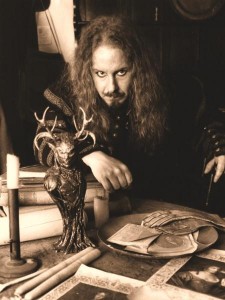 “We planned which songs we were going to record and rehearsed them hard. For Sabbat, we did ‘A Cautionary Tale’, ‘For Those Who Die’ and ‘13th Disciple’, which became ‘Horned Is The Hunter’ when we recorded the album [on ‘History Of A Time To Come’]. It was all a blur; when we did the Sabbat session we travelled down in a hired Luton van, the big old boxy things, with my mate Phil from college driving because he was old enough and had a clean driving licence. We hired the van from some local hire company, and I remember that the van wouldn’t start afterwards. It was winter, absolutely freezing, and the battery was just dead! Of course, there were no mobile phones in those days, so we were all huddled up in the back of the van, freezing to death under a piece of foam rubber and of course a copper comes along and asks what were up to. We rang the van hire the following morning and they sent out a mechanic. We’d bought some porn magazine from a service stop on the way down and stuffed ’em into the glove compartment. Somehow, it had caused something to overheat and shorted the battery wires!
“We planned which songs we were going to record and rehearsed them hard. For Sabbat, we did ‘A Cautionary Tale’, ‘For Those Who Die’ and ‘13th Disciple’, which became ‘Horned Is The Hunter’ when we recorded the album [on ‘History Of A Time To Come’]. It was all a blur; when we did the Sabbat session we travelled down in a hired Luton van, the big old boxy things, with my mate Phil from college driving because he was old enough and had a clean driving licence. We hired the van from some local hire company, and I remember that the van wouldn’t start afterwards. It was winter, absolutely freezing, and the battery was just dead! Of course, there were no mobile phones in those days, so we were all huddled up in the back of the van, freezing to death under a piece of foam rubber and of course a copper comes along and asks what were up to. We rang the van hire the following morning and they sent out a mechanic. We’d bought some porn magazine from a service stop on the way down and stuffed ’em into the glove compartment. Somehow, it had caused something to overheat and shorted the battery wires!
“We were very happy with the results, but it’s so long since I’ve heard them. That session, along with the Kerrang! interview, got us our deal with Noise, for better or worse. Sadly, I never got to meet Tommy Vance, which was a shame because it was the Friday Rock Show that got me into rock and metal when Tommy played Ozzy’s ‘Revelation Mother Earth’.
“The Skyclad session was pretty much the same thing; leaving Newcastle at stupid o’clock to drive to London to record in a day. You actually got hear what the band sounded like as it was all recorded live and there was no Pro Tools or Auto Tune or anything. We were thrown in at the deep end; we had to be well-rehearsed, and I think every band should have to do something like that.”
MARTIN WALKYIER (SABBAT/SKYCLAD)
“It’s easy to forget in the current digital/internet age just how difficult it was to check out new bands in the late ’70s. Of course, I was turned on to numerous bands by friends (and their older brothers), but it was Sounds Magazine and The Friday Rock Show that provided the only real contact with the rock world. There must have been a period of time where I didn’t have a radio in my own bedroom, because I can vividly remember sitting on my parent’s bed every Friday night listening to Tommy Vance on their tiny radio alarm clock. I know I heard The Scorpions for the first time on his show (‘Loving You Sunday Morning’ from ‘Lovedrive’), definitely Diamond Head and Marillion, and Rush as well (something from ‘Hemispheres’ – ‘The Trees’ maybe). It was also the only way to get a taster of the new album by your fave band before it was released. Of course, in those days, fans were FANS and it had to be a real stinker for you to even consider not buying it. As well as the famous live sessions, the Rock Show also used to broadcast sets from the Reading Festival, which was a proper rock festival in those days. I had to skip it in 1982 for some reason but still got to hear Gary Barden shout ‘surprise, surprise’ as he walked out to front MSG that year after Graham Bonnet’s meltdown. Yeah, I have a lot to thank the Friday Rock Show for.”
MARK PALMER (NUCLEAR BLAST RECORDS)
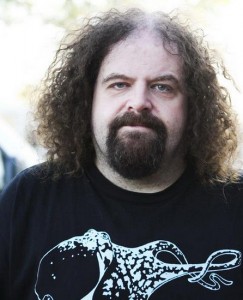 “The Friday Rock show, to me and my friends, was a focus point every week! We would look forward to the show with excitement during the days of laborious school tedium, wondering what cool bands(s) Tommy would introduce us to and there was always something killer to take in during the two hours the show ran for. Amongst the many live recordings he would play from Tangerine Dream or Van Der Graf Generator (bands who I totally appreciate so much more now), which I usually fast-forwarded through as I ritually taped the show, there would be the underground gem, like an advance preview of Venom’s ‘Bloodlust’ single or Raven and Udo doing ‘Born To Be Wild’, or Hellhammer’s ‘Mesiah’. The first time I heard Maiden with Bruce was on the Friday Rock Show. Not bad, I thought ,but ‘Killers’ is still the champion Maiden record and let’s not forget, one of the greatest BBC rock sessions ever! The Mercyful Fate session – wow, when I heard MF, they blew my mind and could not wait to wake up on Saturday morning and play the tape to my buddies. Metal just got even heavier and I was chuffed to bits, but the fondest memory for me to this day, sitting on the steps outside my parent’s house in Broseley, Shropshire, on a cold, Saturday morning as we were huddled together. I pressed play on my clunky tape recorder and hearing ‘Denim And Leather’, an advance track from the new Saxon album of the same name and listening to what the lyrics were about and looking at my mates, we were all smiling. We said all at the same time ‘We have to start a band’. The Friday Rock Show was the only education I needed and I wouldn’t be where I am without the show. Great memories.”
“The Friday Rock show, to me and my friends, was a focus point every week! We would look forward to the show with excitement during the days of laborious school tedium, wondering what cool bands(s) Tommy would introduce us to and there was always something killer to take in during the two hours the show ran for. Amongst the many live recordings he would play from Tangerine Dream or Van Der Graf Generator (bands who I totally appreciate so much more now), which I usually fast-forwarded through as I ritually taped the show, there would be the underground gem, like an advance preview of Venom’s ‘Bloodlust’ single or Raven and Udo doing ‘Born To Be Wild’, or Hellhammer’s ‘Mesiah’. The first time I heard Maiden with Bruce was on the Friday Rock Show. Not bad, I thought ,but ‘Killers’ is still the champion Maiden record and let’s not forget, one of the greatest BBC rock sessions ever! The Mercyful Fate session – wow, when I heard MF, they blew my mind and could not wait to wake up on Saturday morning and play the tape to my buddies. Metal just got even heavier and I was chuffed to bits, but the fondest memory for me to this day, sitting on the steps outside my parent’s house in Broseley, Shropshire, on a cold, Saturday morning as we were huddled together. I pressed play on my clunky tape recorder and hearing ‘Denim And Leather’, an advance track from the new Saxon album of the same name and listening to what the lyrics were about and looking at my mates, we were all smiling. We said all at the same time ‘We have to start a band’. The Friday Rock Show was the only education I needed and I wouldn’t be where I am without the show. Great memories.”
SHANE EMBURY (NAPALM DEATH)
“I loved Tommy. Along with Alan ‘Fluff’ Freeman, he was the voice of rock and metal in Britain. He used to play our tracks regularly on his show, though we never did a session for him. We had previously done a radio session for Radio Trent in Nottingham, and it was that badly mixed we said we’d never do one again. That voice of his was unmistakable. When he introduced your band he made you feel like the best band on the planet. He has never been equalled in my humble opinion. He is still sorely missed.”
PAUL GASKIN (GASKIN)
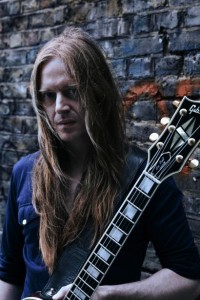 “To a youngster seeking the sounds of hard rock and heavy metal at the start of the ‘80s, the Friday Rock Show on Radio One was nothing less than essential. It’s hard to get across just how exciting it was, waiting for ten o’clock to come around so that two hours of musical heaven could commence. To this day, there are many of us who maintain that Tommy Vance was the greatest DJ of all time. He had the ultimate radio voice, the charm, the charisma… and, just as importantly, the passion for the music.”
“To a youngster seeking the sounds of hard rock and heavy metal at the start of the ‘80s, the Friday Rock Show on Radio One was nothing less than essential. It’s hard to get across just how exciting it was, waiting for ten o’clock to come around so that two hours of musical heaven could commence. To this day, there are many of us who maintain that Tommy Vance was the greatest DJ of all time. He had the ultimate radio voice, the charm, the charisma… and, just as importantly, the passion for the music.”
BILL STEER (CARCASS)
“As a metal fan/listener it was a weekly ritual. The first time I ever heard Angel Witch was on that show in session. Same with Sweet Savage. A few years later Blind Fury did our own session, 1985 I think. Tommy was extremely enthusiastic about it when it went out, he said something like ‘Imagine what these guys are gonna be like in a year’s time’. As it turned out we actually broke up a few months later!”
RUSS TIPPINS (SATAN/BLIND FURY)
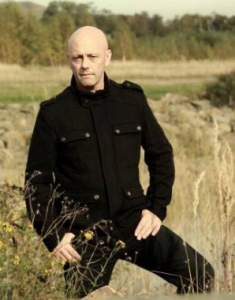 “I first tuned into the Friday Rock Show around 1980 when I was 10-years-old. I had two older friends and they were responsible for me getting into rock/metal and they told me about the show. Every Friday evening from 10 till 12 was pure magic for a young lad like myself. Hearing all the new releases, the old classics and the bands that were in session was awesome. Memories I have are hearing St Vitus, Exciter, weird stuff like Demon Flight ‘Dead Of The Night’ , Jesters Of Destiny ‘Diggin That Grave’, a band called Ground Zero and the Mercyful Fate session, which I still think sound wise is better than ‘Melissa’. My two friends even used to do their own rock show onto a C90 cassette, playing all the singles they had bought that month. They used ‘Coronarias Redig’ by Deep Purple as the intro music. The one thing that changed my whole outlook on music was one evening when Tommy Vance was actually unwell at the time, and I may be wrong here, but I’m pretty sure that Johnnie Walker was filling in that evening, this was around 1986 ( I think ) and he played four songs back to back, which were Montrose ‘Rock The Nation’, Khan ‘Driving To Amsterdam’, The Groundhogs ‘Cherry Red’ and the icing on the cake, Curved Air ‘Hide And Seek’. After I heard Curved Air I was never the same. My musical education had only just begun. Thank you Friday Rock Show.”
“I first tuned into the Friday Rock Show around 1980 when I was 10-years-old. I had two older friends and they were responsible for me getting into rock/metal and they told me about the show. Every Friday evening from 10 till 12 was pure magic for a young lad like myself. Hearing all the new releases, the old classics and the bands that were in session was awesome. Memories I have are hearing St Vitus, Exciter, weird stuff like Demon Flight ‘Dead Of The Night’ , Jesters Of Destiny ‘Diggin That Grave’, a band called Ground Zero and the Mercyful Fate session, which I still think sound wise is better than ‘Melissa’. My two friends even used to do their own rock show onto a C90 cassette, playing all the singles they had bought that month. They used ‘Coronarias Redig’ by Deep Purple as the intro music. The one thing that changed my whole outlook on music was one evening when Tommy Vance was actually unwell at the time, and I may be wrong here, but I’m pretty sure that Johnnie Walker was filling in that evening, this was around 1986 ( I think ) and he played four songs back to back, which were Montrose ‘Rock The Nation’, Khan ‘Driving To Amsterdam’, The Groundhogs ‘Cherry Red’ and the icing on the cake, Curved Air ‘Hide And Seek’. After I heard Curved Air I was never the same. My musical education had only just begun. Thank you Friday Rock Show.”
GAZ JENNINGS (DEATH PENALTY/ex-CATHEDRAL)
Copyright © 2024 Iron Fist Magazine. All Rights Reserved.